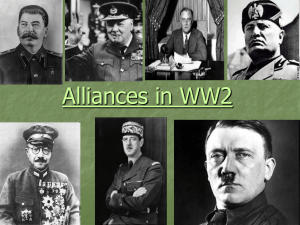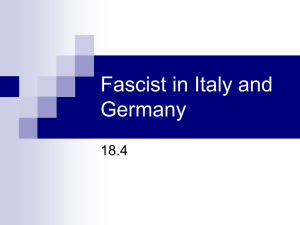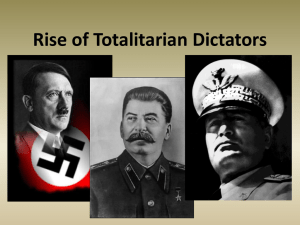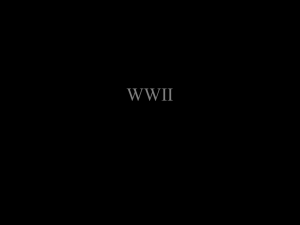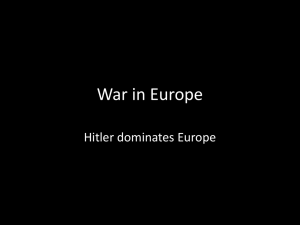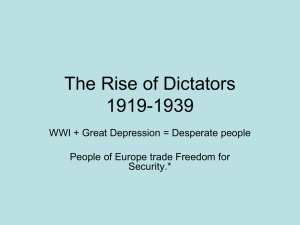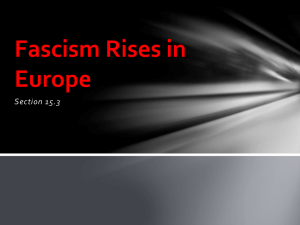The Rise and Rule of Adolf Hitler
advertisement
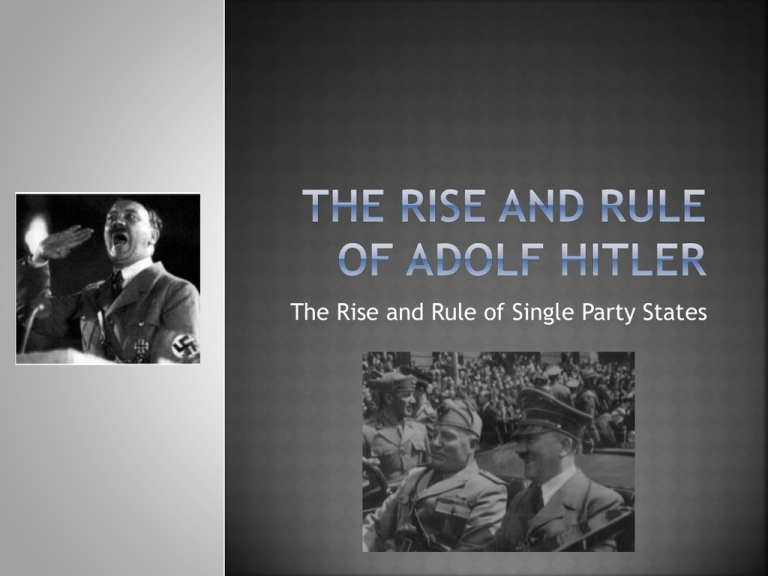
The Rise and Rule of Single Party States DOB: April 20th, 1889 Born in the city of Braunau, Austria. Hitler lost his mother and father during his teenage years and dropped out of high school at age 16. Moving Art to Vienna School The Effects of Vienna on Hitler Hitler developed a dislike for many things in Vienna. Joining the ranks Dispatch Runner Corporal Hitler A sense of belonging The moral letdown Moving to Munich The German Workers’ Party (Deutsche Arbeiterpartei) The National Socialist German Workers’ Party Nazis Goals Benito Mussolini January 1923 The Ruhr Crisis The Reichswehr General Erich Ludendorff The Brownshirts The Beer Hall Putsch Hitler’s Mein Trial Kampf Hitler gains popularity Hitler’s popularity fades The Dawes Plan The Economy turns The Great Depression The Geneva Naval Conference (1927) Calvin Coolidge Results The London Naval Conference (1930) The London Naval Treaty Results 6 million unemployed Factories ceased production Foreign loans stopped or recalled. searching answers for new Problems Democracy? Hitler’s use of propaganda The Treaty of Versailles National Humiliation The Weimar Republic A man of action! Unearned incomes, unfair taxes, trusts, chain stores, and high interest rates. The lowest common denominator. 1928: 12 seats went to the Nazis 1930: 107 seats 1932: 230 seats Making Hitler the Chancellor President January Shared The Who Hindenburg 30, 1933 Power? Reichstag Building to blame? freedom of speech and press The Brownshirts Dictatorial The powers Nazi Revolution Germany All ceased to be Federal other parties were destroyed Purging June the Brownshirts 1934 The Third Reich Der Führer Hitler’s Racial The view of Jews Science Nuremberg Laws Dachau November 9, 1938 Kristallnacht What “provoked” the incident? Closed doors The Gestapo The People’s Court Geneva 1932-1934 Self Interests Depression Germany leaves the LON The role of the Soviets LON still dealing with the Manchurian Incident Luftwaffe Soviet Reaction to Hitler Poland German-Polish Non-Aggression Pact Conscription The Soviets join the League Franco-Soviet Pact Austrian Nazis Engelbert Dollfuss Reaction of the Western powers Mussolini’s reaction Preventing the Anschluss January 1935 The league of Nations Nazi Agitation Reunification March 1935 Disarmament The Response 100,000 to 600,000 March 7, 1936 The Franco-Soviet Pact Weaknesses in the German Army The response of France The response of Great Britain Going to war? Mussolini’s decision (1936) The Earth’s Axis March 1938 Austrian Chancellor Kurt von Schuschnigg Vote The on it? Anschluss Nazi Propaganda Czechoslovakia The Sudetenland Britain and France Hitler’s Demands Neville Chamberlain Eduard Daladier Munich Four Powers Soviet Union? Czechoslovakia? Loss of strategic territory “peace in our time” Not to be out done, Mussolini took over Albania in April 1939. Rearmament by Germany French Response British Response defensive strategies The Maginot Line The West Wall Mobilizing the Economy Financing Hjalmar British Rearmament Schacht Blockade Hitler’s 4 Year Plan Where did the money come from? 1939-2 army. million in the Germany? France? Britain? Memel Danzig www.google.com/maps Poland Anglo-French The Guarantee Anti-Commintern Pact The Nazi-Soviet Pact V.M. Molotov Joachim Ribbentrop





